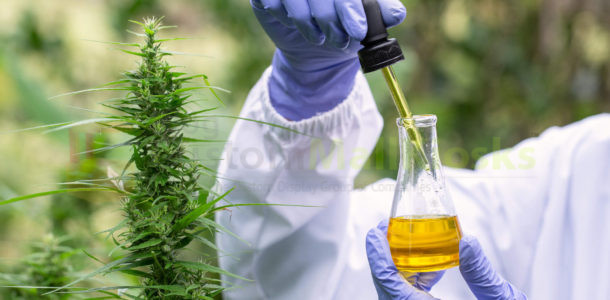https://www.canna-tech.co/cannatech/brightfield-group-2020-mid-year-us-cbd-update/

COVID-19 Impact
In the first half of 2020, CBD companies are experiencing a loss in revenue due to store closures and consumer concerns about Coronavirus and their finances. Shelter-at-home policies paused hemp-derived CBD (cannabidiol) sales through many brick-and-mortar retailers that were temporarily shuttered in March. While grocery, drug, and health food stores remained open as essential businesses during this time, other retailers selling CBD products such as vape shops and CBD specialist retailers either closed temporarily during the crisis or only offered curbside pickup and delivery. While most states and cities reopened by the end of June, a resurgence of COVID-19 cases in the Sunbelt, consumer worries about contracting the coronavirus, and social distancing guidelines are reducing foot traffic to stores. Another challenge for CBD consumers is the rise in unemployment that limits consumers’ ability to buy CBD products. The US is experiencing the highest unemployment rate since the Great Depression in the 1930s, with an 11.1% unemployment rate in June, up from 3.8% in February.
The US hemp-derived CBD market is projected to reach $4.7 billion in sales in 2020, with 14% growth over 2019 sales of $4.1 billion. Full year 2020 retail sales are not expected to reach levels anticipated prior to the emergence of the COVID-19 pandemic. In addition to the economic pressures faced by consumers and temporary store closures, inaction by the US FDA (Food and Drug Administration) is constraining growth of the US CBD market.
As Americans stay at home during the COVID-19 pandemic, CBD companies are facing both challenges and opportunities. A major challenge is the loss of revenue from store closures as many retailers selling CBD products had either closed temporarily or only offered curbside pickup and delivery when shelter in place orders were enforced. Even for CBD specialist retailers and smoke shops that remained open, they are experiencing steep declines in sales as social distancing guidelines and consumer worries about contracting the coronavirus keep shoppers at home.
A strong e-commerce presence is especially important for CBD companies during this time as early stay-at-home orders shuttered retailers and sent many consumers to e-commerce. Many consumers reduced visits to stores when stay at home policies were in effect and are still wary of visiting physical stores. Nearly half (45%) of CBD consumers surveyed in June 2020 have moved their CBD purchases online as a result of the coronavirus crisis. Millennial shoppers are the most likely to have switched to e-commerce for their CBD needs, with 54% reporting switching from brick and mortar stores to online as they also increase their usage and spending during this stressful time. CBD market leaders have seen online sales increase dramatically in the first half of 2020 but are still making efforts to expand in brick and mortar retailers to set up for future success and broader brand awareness. CBD companies with extensive DTC (direct-to-consumer) experience, databases of e-newsletter subscribers, and large social media followings have been able to reach out to their consumers and sell through their brand websites.
Growth Drivers
• Extensive media coverage and natural health and wellness trends: Growing awareness of CBD’s health benefits, combined with a movement toward natural alternatives to pharmaceuticals, is driving consumer demand for CBD products.
• Expanded distribution channels: CBD products went mainstream in 2019 as CVS, Walgreens, Kroger, Albertsons, and other national retail chains began to sell CBD products in their stores. Supermarket chain Publix, beauty specialist Bluemercury, and QVC home shopping channel have begun selling CBD products in 2020.
• Strategic marketing: CBD companies are using multiple methods including social media, podcasts, radio ads, print media, and infomercials to reach consumers.
• Product variety and evolution: The growing diversification and sophistication of CBD products appeals to a much broader consumer audience beyond cannabis users and natural food store consumers.
Companies Continue to Focus on Innovation (2nd gen of CBD products)
Innovation in CBD continues to be active despite many employees working remotely and meetings with retailers and distributors taking place on Zoom instead of in-person. Companies are going beyond adding new flavors and are investing in research & development to introduce new products that contain botanical ingredients and minor cannabinoids CBG and CBN alongside CBD to offer additional benefits.
Immunity support is a key area of focus in 2020 for CBD companies as consumers seek out ingredients that support immune health such as elderberry, echinacea, and vitamin C during the coronavirus pandemic. Bluebird Botanicals’ new Immune Support+ Vitamin D3 & CBD Oil combines a full-spectrum hemp extract blend with vitamin D3, which promotes a healthy immune response. Medterra’s new Immune Boost Drops combine elderberry, echinacea, vitamin D, ginger root, ashwagandha, vitamin C, reishi mushroom, and lemon balm to support immune health with the calming power of CBD.
CBD companies are also beginning to incorporate minor cannabinoids including CBG and CBN alongside CBD as combining cannabinoids and terpenes (found naturally in hemp) are believed to produce the “entourage effect” where the compounds work synergistically to enhance the effects of each component. The price of CBG has also come down recently as hemp farmers have found methods to cultivate hemp strains with higher CBG percentages. CBDfx’s new Wellness 2:1 CBD + CBG Tincture offers a 2:1 ratio of CBD to CBG along with 18 proprietary terpenes, Curcumin, and Coenzyme Q10 to boost the entourage effect. CBDistillery’s Relief + Relax CBD CBG 1:1 Oil combines the benefits of CBD and CBG. CBG (cannabigerol) is believed to have antimicrobial, analgesic or anti-inflammatory properties. CBD American Shaman’s CBNight Water Soluble CBN Oil is a blend of cannabinoids to promote better sleep, without the common side effects of sleep aids. CBN (cannabinol) may have antibacterial and anti-inflammatory benefits but is best known for its sleep-enhancing benefits.
Product innovation is also occurring as consumer packaged goods and pharmaceuticals companies enter the CBD market. Church & Dwight introduced Vitafusion CBD Full Spectrum Hemp Extract Gummies in December 2019 as CBD gummies from America’s #1 gummy vitamin brand. The gummies are made with full spectrum hemp extract and come in three varieties – CBD Full Spectrum, CBD Sleep Well (with melatonin), and CBD Chill Mood (with L-Theanine to provide calm and relaxation). Hello Products (now owned by Colgate-Palmolive) introduced Hello CBD Soothing Mouthwash and Fluoride Free Toothpaste in February 2020, which are formulated with broad spectrum hemp oil and hemp extract and contain additional ingredients such as aloe vera, coconut oil (to soothe and moisturize) and tea tree oil or activated charcoal (to reduce bad breath). In the beauty and skincare arena, luxury beauty brand Chantecaille introduced its first CBD product – CBD 300 Face and Body Cream – that combines the soothing, calming benefits of broad-spectrum CBD with eggplant stem cell extract, Cannabis Sativa stem cell extract, and Cherimoya extract to visibly enhance skin’s moisture content and reduce visible redness. Tea company Brew Dr. launched its Tranquil Kombucha With CBD that merge herbs such as rosemary, mint, and sage with Oregon-grown hemp from East Fork Cultivars. GlaxoSmithKline ventured into CBD with its February 2020 launch of 36 Bushels topicals line that incorporate botanical ingredients. 36 Bushels promises triple tested ingredients and that they carry out over 36 quality checks, hence the 36 Bushels name. The line uses broad spectrum derived extracted from USA-grown hemp, is guaranteed 0.0% THC, and is crafted in small batches with consistent quality.
Many consumer packaged goods companies – especially food and beverage – are rationalizing their portfolios and focusing on core brands, rather than variety and innovation. This is to help streamline supply chains and reduce complexity in the uncertain environment created by the coronavirus. CBD companies and brands are doing the opposite and rolling out innovation at a high pace to draw in new consumers and keep existing CBD users interested in the industry. New functional ingredients can help bring new consumers to CBD, especially as natural ingredients complement the many uses of CBD and help consumers better understand how to incorporate these products into their daily or weekly wellness habits. Featuring these products that also offer accessible price points can help drive incremental CBD sales for convenience operators and encourage routine purchases. Major players such as CBDfx and Medterra who have rolled out innovation at a rapid pace in 2020 have been rewarded with increased brand awareness and sales in this challenging time.









